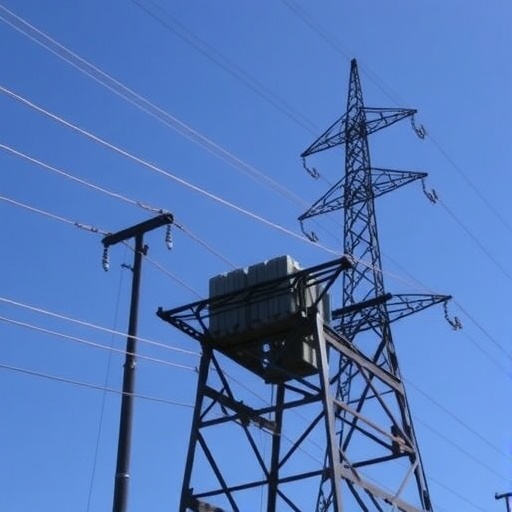The field of energy management is undergoing a profound transformation driven by the urgency to balance electricity supply and demand amidst the increasing reliance on renewable energy resources. In this context, a pioneering research initiative led by Professors Emilio Pérez Soler and Ignacio Peñarrocha Alós from the Electricity, Electronics, and Automation Research Group at Universitat Jaume I is making significant strides toward enhancing the integration of renewable energy into power grids. Their project, titled “Management of Renewable Systems with Storage and Converter Control to Contribute to the Operation of the Future Power System,” aims to create sophisticated control strategies that can effectively manage the complexities introduced by renewable sources integrated with battery storage.
As the world grapples with the challenges posed by climate change and the depletion of fossil fuels, the shift toward renewable energy sources such as wind and solar has gained momentum. However, one of the critical hurdles that remain is ensuring a stable and reliable energy supply that can prevent fluctuations in electricity availability. The recent blackout incident that occurred on April 28, 2025, has underscored the urgency of developing reliable technologies that can handle the unpredictable nature of renewable energy generation. This context provides a backdrop for the ambitious research conducted by the team at Universitat Jaume I.
The research team has developed advanced predictive models that are designed to analyze and forecast electricity market dynamics. These models assess daily market prices and services dedicated to regulating frequency within the power system, a key aspect in maintaining grid stability. At the heart of their research lies a groundbreaking strategy founded on deep reinforcement learning, which enables battery storage systems connected to the grid to participate optimally in varying electricity markets. The comprehensive understanding of market behaviors afforded by these models allows for real-time decision-making that optimizes the contribution of energy storage solutions.
In parallel, the group has turned its attention to improving the performance of lithium-ion batteries—widely regarded as crucial for energy storage in modern power applications. The research has yielded novel techniques that enhance the estimation of battery state of charge and health. By refining these measurements, the project not only improves battery performance but also extends their lifespan, thereby ensuring that energy harvested from renewable sources can be effectively stored and utilized when needed.
One of the most significant achievements of this research initiative has been the demonstration that employing advanced control mechanisms can result in the more reliable operation of renewable energy plants. By augmenting the time renewable plants remain connected to the grid, the research showcases how enhanced stability in power systems can be achieved. This proactive approach not only addresses the current issues surrounding renewable integration but also contributes to the future resilience of power systems as they evolve to incorporate increasingly diverse energy sources.
As the project nears its completion phase, the focus has shifted toward the empirical validation of the proposed control strategies. Throughout this year, extensive experimental validations are set to take place, leveraging a real-time testing platform designed for assessing the joint operation of batteries, converters, and control systems. Such rigorous testing will serve to fortify the credibility of the developed strategies, ultimately leading to their potential implementation within real-world power systems.
Collaborative efforts lie at the core of this research, with the team forging partnerships with notable institutions such as the University of the Basque Country, the Tyndall National Institute in Ireland, and the Virtual Vehicle research center in Austria. These collaborations bring together a wealth of expertise, focusing on key aspects of renewable energy integration, smart grid innovations, and advancements in electric vehicle technologies. Furthermore, partnerships with industry leaders such as Abervian and HESStec pave the way for practical applications of research outcomes in the burgeoning field of energy storage applications and synthetic inertia for renewable installations.
This project is a vital component of a broader governmental initiative, specifically the PID2021-125634OB-I00 plan, which is being funded by MICIU/AEI and the EU’s FEDER program for the period spanning 2021 to 2023. The State Plan for Scientific, Technical, and Innovation Research aims to bolster strategic sectors such as health care, ecological transitions, and digitization, further emphasizing the importance of energy resilience in economic recovery efforts.
As we move toward a future defined by sustainable energy practices, the research conducted at Universitat Jaume I stands as a beacon of innovation in energy management and control strategies. The implications of these developments are profound, enabling more robust energy infrastructures capable of harnessing the power of renewables and securing energy access for future generations.
The future of energy systems is not merely about integration; it’s about intelligent, adaptable, and resilient frameworks that can dynamically respond to the challenges of an ever-changing energy landscape. The work being undertaken by Professor Pérez Soler, Professor Peñarrocha Alós, and their research group exemplifies the path forward—a future where renewable energy can be successfully managed in coordination with energy storage solutions, fostering a sustainable and reliable power generation model.
With the completion of this project on the horizon, the anticipation builds around the potential real-world applications of their research findings. This initiative is not just an academic endeavor; it holds significant promise for transforming how societies engage with energy, moving toward a sustainable future powered primarily by renewable resources.
Subject of Research: Not applicable
Article Title: Deep learning-based prediction models for spot electricity market prices in the Spanish market
News Publication Date: 16-Jul-2025
Web References: Link to article
References: Not available
Image Credits: Universitat Jaume I of Castellón
Keywords
Renewable energy integration, energy storage systems, advanced control strategies, predictive models, deep reinforcement learning, power grid stability, battery performance, real-time testing, energy market dynamics, collaborative research.
Tags: advanced control strategiesbattery storage solutionsClimate Change Solutionselectricity supply and demandenergy management transformationfuture power systemsgrid stability technologiespower grid managementrenewable energy challengesrenewable energy integrationrenewable energy sourcesUniversitat Jaume I research





